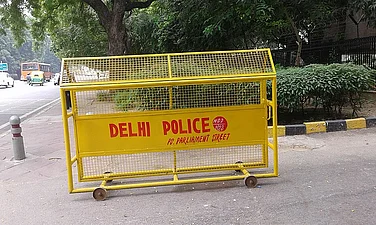The Centre on Tuesday informed the Supreme Court that it would present a roadmap for the restoration of statehood to Jammu and Kashmir on Thursday (August 31).
On the 12th day of hearings of pleas against the abrogation of Article 370, the Centre on Tuesday continued to make its case that Article 370 was temporary, it denied provisions of the Constitution of India to the people of J&K, and that the Constitution of J&K was always subordinate to the Constitution of India.
As the Centre made its case, Chief Justice of India (CJI) DY Chandrachud said that it indeed appears that the J&K Constitution "was always meant to be subservient to India" and was not "a document which can be equivalent" to the Constitution of India.
A five-judge constitution bench of the Supreme Court headed by CJI Chandrachud is hearing a clutch of petitions challenging the abrogation of Article 370 by the Narendra Modi government. On August 5, 2019, the Modi government abrogated Article 370 that provided J&K its special status. Until 2019, the J&K had a separate constitution and a separate flag. In addition to scrapping the special status, the Centre also bifurcated J&K into two Union Territories of J&K and Ladakh.
Besides Chandrachud, the Supreme Court constitution bench hearing the case comprises Justices SK Kaul, Sanjiv Khanna, BR Gavai, and Surya Kant.
Centre to present roadmap for J&K's statehood on August 31: Centre
Reiterating the longstanding position that statehood of the Jammu and Kashmir will be restored as things normalise, the Centre on Tuesday informed the Supreme Court that it would present a roadmap for J&K's statehood on Thursday (August 31).
"The instructions are that UT is not a permanent feature. But I will make a positive statement day after tomorrow. Ladakh will remain UT," said Solicitor General Tushar Mehta, appearing for the Centre, as per Live Law.
Mehta also quoted the government statement from the time of abrogation: "As far as the question for UT is concerned, as soon as the situation returns to normalcy, at the right time, the current government does not mind conferring the status of a State (on J&K)."
Centre argues J&K Constitution subordinate to Indian Constitution
The Centre also continued to make the case for the Constitution of J&K being subordinate and subservient to the Constitution of India.
Mehta informed the Supreme Court that as the Constituent Assembly of J&K, which drafted the Constitution, was established by Article 370 of the Constitution of India, the resultant Constitution of J&K was always subordiante and subservient to the Constitution of India.
When Chandrachud asked whether the role of the Constituent Assembly of J&K is the role created for it by Constitution of India and nothing beyond that, Mehta said, "Yes, it is subservient and subordinate. It never had original Constituent powers."
Mehta said that sovereignty is among the main features of a document to be a Constitution and J&K's Constitution lacked sovereignty and other features. Earlier on Monday, the Centre had similarly argued that the Constitution of J&K was a legislation and not a Constitution in any real sense.
"Constitutions have certain attributes - it must be a document of governance providing for everything. This constitution only has certain aspects, rest they leave it to Constitution of India. For being recognised as a Constitution, you must provide for a kind of sovereignty. Sovereignty would include right to acquire new areas, right to cede territories - which we have in Articles 1,2,3,4. None of the attributes of a constitution can be attached to J&K constitution. It was a piece of legislature recognised till 5 August 2019," said Mehta, as per Live Law.
Chandrachud says that there is another reason why J&K Constition could be subservient to the Constitution of India. He cites the provision of the erstwhile J&K Constitution which said that "executive and the legislative powers of state extends to all matters except those in respect of which parliament has a power to make laws under Indian Constitution".
"So once the constitution of India defines areas in which parliament has power to make laws then that is denuded from the jurisdiction of j&k legislative assembly...It's very obvious from S 5 that once constitution of india prescribes a legislative domain for parliament, that is denuded from legislative domain of the J&K legislative assembly. In that sense the J&K constitution was always meant to be subservient to India... it's not a document which can be equivalent," said Chandrachud, as per Live Law.
Earlier, the Centre had argued that the Constituent Assembly of J&K always meant the legislatie assembly. The interpretation is key to the case as the President of India could amend (and therefore abrogate) Article 370 with the consent of the Constituent Assembly of J&K. Those opposed to Modi government's abrogation of Article 370 argue that as the Constituent Assembly ceased to exist in 1957, the power to amend or abrogate Article 370 also ceased to exist and the provision became permanent. The Modi government, on the other hand, interpreted that the powers of the Constituent Assembly transferred to J&K legislative assembly and, since at the time of abrogation the legislative powers were with the Parliament, the Parliament could also amend or abrogate Article 370




















.png?w=200&auto=format%2Ccompress&fit=max)





